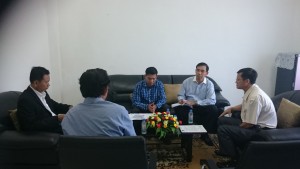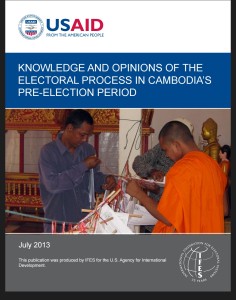Political Paradigm of Pragmatism from the Khmer Youth part 54
This part (54), Mr. Sophan Seng elaborated about the meeting with NEC’s officials on February 19, 2016. Mr. Sophan Seng who is the leader of the CEROC, was honored to meeting H.E.Kuoy Bunroeun, Deputy of NEC at the head office to discuss the right to vote of Cambodians overseas.
 The meeting was anticipated by two permanent members and two deputy secretaries of the current NEC. The discussion is summarized following:
The meeting was anticipated by two permanent members and two deputy secretaries of the current NEC. The discussion is summarized following:
Mr. Sophan Seng highly valued the new NEC that is better and more independent than before including the high expectation of its performance for this upcoming commune election 2017 and national election 2018. Precisely, he addressed the need to allow and facilitate access for Cambodians overseas to vote in Cambodia elections (inclusiveness). The CEROC’s objectives are: – to organize suggestions, petitions, and participation of all Cambodians overseas, and – to produce paper work on mechanism, technical and comparative studies through researches and academic gatherings.
Solution: H.E. Kuoy Bunroeun welcomed the tasks of research and recommended to submit petition through a right channel. NEC is implementing in accordance to the existing laws solely.
- In the future, the NEC shall prepare high ranking officer(s) to visit Khmers diaspora to interact with them about the progress of the NEC.
-
H.E. Kuoy Bunroeun debriefed the advantage and disadvantage points of the new NEC following:
Advantage Points:
- Institutionalized into Cambodia Constitution
- Procedures, mechanism, and implementation of the NEC
- Election laws: new voter registration using fingerprint, photos and computer database etc.
- Able to make all decision makings
Disadvantage points:
- Population database and identity matching are under limit
- Ability of NEC’s staffs especially in each voting booth (PSO) is under limit
- Infrastructure such as electricity is very limited
- Etc.


